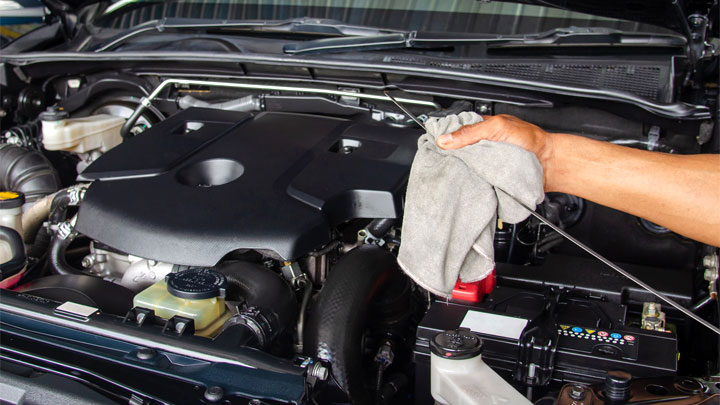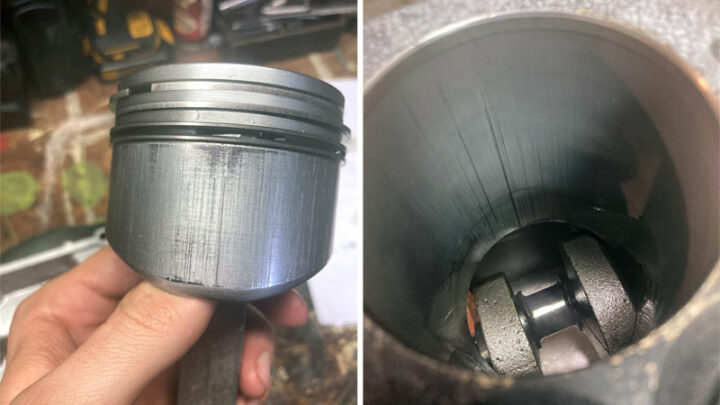Piston Slap: Serious Problem or Just an Annoyance?
When an engine suddenly starts making an abnormal noise, it’s natural for drivers to worry. One such noise that typically generates significant cause for concern is piston slap.
Piston slap is a distinct sound that can be unsettling, especially if you’re unfamiliar with it. But is the concern justified? Read on to learn what causes piston slap, how to identify it, and whether it’s a serious issue or merely a nuisance.

What Is Piston Slap?
Piston slap is a knocking or smacking noise caused by an engine’s pistons rocking angular within their respective cylinder bores, thereby chattering against these cylinder walls themselves.
Generally speaking, piston slap tends to occur when a cylinder’s bore diameter or wall-to-wall clearance exceeds specification, and/or grows excessive in relation to the diameter of the piston within.
Here’s a simplified example of what’s going on:
Piston slap typically occurs most prevalently in high-mileage engines that have experienced a significant amount of wear. Naturally, some internal combustion engines are somewhat more prone to wear of this type and degree than others.
While piston slap can plague virtually any engine, certain GM engines have shown a higher than average propensity for such issues.
Additionally, piston slap is also more defined at startup, or within the first few minutes of engine operation. This stems from the fact that the affected engine’s pistons have not yet swollen to the maximum degree possible, by means of thermal expansion.
Once such expansion takes place, the resounding slap noise heard under such conditions often quiets to a noticeable degree.
What Does It Sound Like?

Piston slap, also known as a false knock, typically sounds like a rather loud, yet muffled, metallic chattering or rapping noise. In most cases, this “slap” is most audible at startup, and increases in speed in parallel to rises in engine RPM.
Generally, piston slap will become far less noticeable as the affected engine rises in operating temperature, which can take up to 10 minutes.
Here are a couple examples of what piston slap sounds like:
Example 1:
Example 2:
Common Causes of Piston Slap
Piston slap can be caused by one of several different underlying issues, some of which are easier to diagnose than others. With a firm understanding of these potential causes, you’ll be most likely to recognize piston slap as it occurs, allowing you to take appropriate action.
#1 – Low Engine Oil
A continued lack of sufficient lubricating engine oil can quickly initiate the type of wear that leads to piston slap. This lack of lubrication often leads to worn/degraded pistons, piston rings, and cylinder walls. This is yet another reason why car owners should check their engine oil on a regular basis, especially in high-mileage engines.

#2 – Loss of Engine Oil Pressure
Piston slap can also initially be caused by a loss in engine oil pressure. If an engine’s oil pressure drops significantly while in operation, as the result of oil pump failure, or similar mechanical issues, piston/cylinder bore damage can quickly result.
Any piston slap that is initiated under such circumstances, is unlikely to improve thereafter.
#3 – High Mileage
Some cases of piston slap result from nothing more than simple wear and tear. Even well taken care of engines will incur piston/cylinder wall metal erosion, assuming they have logged enough miles.
Because of that, piston slap cannot always be prevented and does not signify that an engine has been mistreated or neglected.
When Piston Slap Is a Minor Issue

Piston slap, in the absence of additional engine issues, is generally considered to be a relatively minor issue. Is the sound of piston slap annoying? Will piston slap make you shake your head in disgust?
While the answer to both these questions is a resounding, “yes’ ‘, there is little reason to panic. This is especially true if you are only planning on keeping the vehicle in question for a limited amount of time.
The onset of piston slap is not really a reliable indicator of the remaining life left in an engine. In truth, some engines continue to operate without fail, though plagued by annoying piston slap, for 2-3 years or more.
Therefore, writing an engine off for issues of this type is often premature. Piston slap simply means that a certain amount of internal engine wear has taken place.
When to Be Concerned
As stated above, piston slap is not cause for extreme concern, in the absence of additional secondary symptoms that notably indicate a loss of engine operating efficiency.
Some of the most noteworthy of these symptoms include reduced engine performance, increased oil consumption, and noticeably heavier exhaust.
In addition, piston slap that does not quiet after several minutes of driving should serve as cause for concern.
Identifying the Source
Identifying piston slap can be tricky at times. This type of noise is often mistaken for rod bearing knock, or even in some cases, lifter tick.
Aside from listening carefully to discern the actual source of this noise, it also pays dividends to understand that the sound of piston slap is typically reduced to a notable degree as the engine in question rises to operating temperature. If the opposite seems true of an internal engine noise, further diagnosis of the engine’s rotating assembly will be required.

How to Fix
Piston slap can be addressed in one of two different manners, meaning that one can shoot for a short-time band-aid fix, if you will, or take the more invasive route to remedy the root cause of the issue as a whole.
Short Term Solutions
One of the most widely employed of all short term remedies for piston slap, revolves around the use of engine oil of a thicker viscosity. In some cases, this will indeed quiet piston slap significantly.
Alternatively, some have had a certain degree of luck by simply switching to the use of synthetic motor oil. While these remedies do have the potential to reduce piston slap, neither actually fixes the internal wear that the affected engine has incurred.
Long Term Solutions
The only long term solution to the issue of piston slap involves overhauling the engine in question. This will require replacing the affected pistons, and boring each respective cylinder bore. This degree of repair can potentially cost more than a vehicle itself is worth, depending upon the vehicle’s age, condition, etc.
- P2196 Code (Symptoms, Causes, and How to Fix) - Jun 13, 2024
- 6 Symptoms of a Transmission Pan Gasket Leak (and Replacement Cost) - Jun 10, 2024
- 4 Symptoms of a Cracked Oil Pan (and Repair Cost) - Jun 4, 2024
